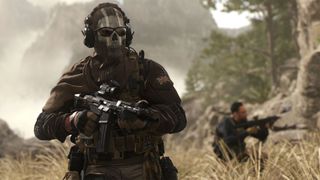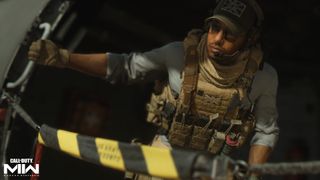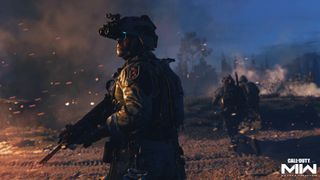I love Call of Duty, and I'm worried about Modern Warfare 2
Splash back

Every so often, even before the pandemic, Glastonbury Festival would take a year off – forgoing an income of tens of millions in order to let the grass grow back, the grumbling of the locals subside, and perhaps most importantly, to let us feel its absence. In 2019 organisers noted that, following a fallow year, their mud-caked institution was even more popular than before.
Maybe Activision ought to pull more of its executive team from the festival industry, rather than the Bush administration. Despite driving Guitar Hero into the ground with annualisation all those years ago, it’s been too slow to observe the same effect on Call of Duty. According to a Bloomberg report, 2023 will be the series’ first fallow year after almost two decades, following poor sales of Call of Duty: Vanguard and a period of production chaos within Call of Duty’s studio network. But it arrives too late to impact Call of Duty: Modern Warfare 2, which as the hosts of yesterday’s Summer Game Fest showcase were keen to remind us, comes out this year on October 28.
“In 2019,” said Call of Duty general manager Johanna Faries yesterday, “Modern Warfare changed everything,” and that’s true. Not only was the reboot an enormous commercial hit in its own right, but its engine, aesthetic and universe was the foundation for Warzone, a Covid cultural phenomenon that has been a fixture of our living rooms ever since.
Activision will have few regrets about the way its battle royale was rolled out. But one side effect of its ongoing live service success is that the grass is well and truly trampled. There has been no opportunity to miss Modern Warfare. Its wet sheen is baked like screen burn into the public imagination, as familiar as Fallout and just as tired.
Faries pitched “oil rigs, cargo ships and staggering odds” – all classic characteristics of COD campaigns. Trouble is, I’ve been playing a ship-based 2v2 arena named Cargo on and off since 2019. And an oil rig map, riffing on the original Modern Warfare trilogy, was added to the reboot at the height of the pandemic. By now, these decks and gantries are better known to us than our local parks and malls.
The expendables
It’s no surprise, then, that the new level shown at Summer Game Fest came off like a remix of a remix – first recalling the Omaha Beach landing, the image associated with COD’s birth, before segueing into a premise pulled straight from Modern Warfare 2’s noughties namesake: climb the rig. The rug pull – discovering that the objective isn’t on the rig after all – comes as the team tears open a cargo container, a moment designed to evoke the squad’s first ever mission together, 2007’s Crew Expendable. These small shakeups hardly register as novelty; given that both of Infinity Ward’s pre-renaissance Modern Warfare games have been remastered in recent years, its setpieces are all-too fresh, like the fish wriggling just below Soap’s feet in the Atlantic ocean.

None of which is to deny that Infinity Ward is full of teams at the peak of their craft. The sequence is stuffed with exquisite, subtle touches: the crossing legs of the squaddie who lands on the rig before you, as he seamlessly transitions from a crouch into a sidestep; the muted pew-pew of a silenced handgun firing behind a glass pane; the angled rain, and the eerie diffuse lighting synonymous with sticking your head in a stormcloud.
Get daily insight, inspiration and deals in your inbox
Get the hottest deals available in your inbox plus news, reviews, opinion, analysis and more from the TechRadar team.
Dog gone
Yet behind the scenes, greater concerns emerge. Taylor Kurosaki and Jacob Minkoff, the Naughty Dog veterans who pulled the studio out of creative freefall with the deeply underrated space caper Call of Duty: Infinite Warfare, left in early 2021 to pursue a “rare and exciting new opportunity”. We can only hope that the thematic resonance and thoughtful character work that distinguished their games has left an indelible groove in Infinity Ward’s culture. Though it has to be said the new focus on special forces operator Ghost, another noughties hangover with the personality of a headsock, is not entirely reassuring.
Ghost is a noughties hangover with the personality of a headsock
For all the good Warzone has done Call of Duty and its revitalized community, it’s also done a number on Kurosaki and co’s storytelling. As Modern Warfare characters have been folded into the battle royale as skins, the tight plotting of 2019’s Modern Warfare campaign has been unraveled. As a fan, it’s no longer clear where this new game’s tale will begin – what Warzone-only events will be counted or ignored, or even whether key characters are living or dead. Warzone may now be overseen by Raven Software, but it’s evidently been one hell of a distraction for Infinity Ward, the studio that helped birth it.

Add to those potential problems the enormous and unhappy fact of war in Europe. The continent has long been Modern Warfare’s playground, and Russian ultranationalism was the bogeyman that loomed over the entire original trilogy. If this new game loosely follows the threads left by its forebears, it may well reintroduce Makarov as a villain.
COD has always danced as close to real-life conflict as it can – that was part of Modern Warfare’s initial ‘behind the headlines’ allure, after all – but given Infinity Ward’s past missteps with history and sensitivity, it’s hard not to wonder whether Activision should have made 2022 its fallow year instead.

Jeremy is TRG's features editor. He has a decade’s experience across publications like GamesRadar, PC Gamer and Edge, and has been nominated for two games media awards. Jeremy was once told off by the director of Dishonored 2 for not having played Dishonored 2, an error he has since corrected.
Most Popular

